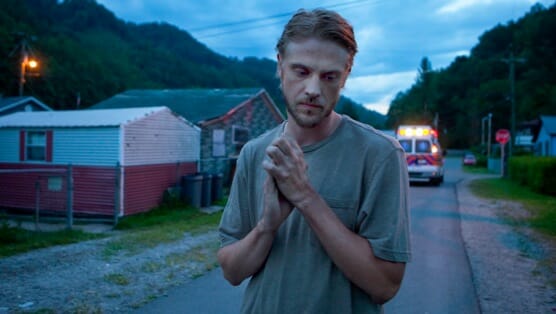Little Accidents

Although the drama Little Accidents is set in a small West Virginia coal-mining town, its broader themes—classism, corporate ethics and personal responsibility—resonate far beyond Appalachia. In her artful feature film debut, writer-director Sara Colangelo deftly avoids the hillbilly stereotypes as well as movie-of-the-week territory with compelling characters who struggle with their own lies and grief.
Coal mining is a dying industry in West Virginia, with jobs lost to mechanization and the once-abundant coal seams running low on ore. The opening scene’s bleak landscape, coupled with a descent into the dark mine shaft, sets the film’s overall tone. Amos Jenkins (Boyd Holbrook) and his coworkers ride into the mine as many have done before; the film then immediately cuts to Amos testifying before a panel of white-collared lawyers and businessmen. We learn that Amos is the sole survivor of a disaster that killed 10 others, and he’s feeling pressure from all sides. The victims’ families hope his testimony will help their class action suit, while the opposing side—which includes the company and miners like his father—insist they can’t survive if the mine closes. Amos says he can’t remember the incident, but he’s also stalling for time as he holds the fate of the company and the town’s residents in his hands.
Set against this polarizing backdrop is the disappearance of teenager J.T. Doyle (Travis Tope). His father, Bill (Josh Lucas), is the executive under fire for neglecting safety conditions at the mine. Bill’s marriage to Diane (Elizabeth Banks), already buckling under stress from the impending lawsuit, is further tested. She finds unlikely solace with Amos, the one person who can ruin her husband and their comfortable, well-appointed lifestyle.
Rounding out the ensemble of characters is J.T.’s classmate Owen (Jacob Lofland), whose father died in the mining accident. Although Owen knows something about J.T.’s whereabouts, he keeps the information to himself to avoid getting in trouble and further upsetting his now-widowed mother (Chloë Sevigny, in a subtle performance). Instead, for a self-imposed penance, Owen fosters a bond with Diane, doing odd jobs around her house and becoming something of a surrogate son. Owen’s own mother can’t understand the newfound relationship between the Doyles and her child, and thinks that Owen simply admires their bourgeois lives.
The mining accident—reminiscent of 2010’s Upper Big Branch Mine tragedy in West Virginia, in which 29 miners died—is only discussed in the past tense. Colangelo wisely avoids dwelling on the accident itself, its immediate aftermath or the fight between the union and mining company. Instead, she turns her focus toward the individual stories, and the grief that envelops the community.
-

-

-

-

-

-

-

-

-

-

-

-

-

-

-

-

-

-

-

-

-

-

-

-

-

-

-

-

-

-

-

-

-

-

-

-

-

-

-

-








































